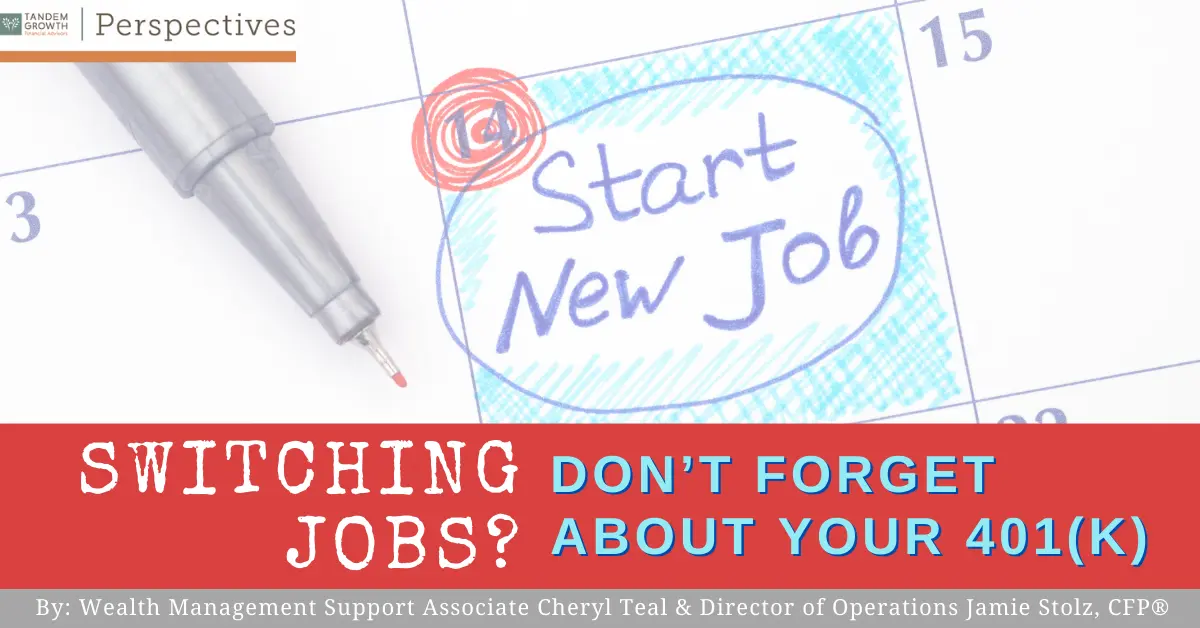
By: Cheryl Teal & Jamie Stolz, CFP®
Changing jobs can be a daunting task with many decisions to make. One of these decisions you’ll face is what to do with your old employer-sponsored 401(k) account. Generally, you have four options for handling your retirement funds which we’ve outlined below. You’ll also find the general steps to follow when initiating a rollover.
Option 1: Leave Funds in Your Old Plan
- Your 401(k) funds can continue to grow but are usually considered “inactive” if you’re no longer on the payroll.
- Be aware of rules and potential fees for maintaining a dormant account as well as minimum balance size (in many cases, plans require at least a $5,000 balance).
- Neglecting to update your contact information may lead to forgotten accounts.

Option 2: Cash Out of the Account
- You do have the option to liquidate your old 401(k) and take a lump-sum distribution.
- You may be required to pay ordinary income tax on the balance plus a 10% early withdrawal penalty if you are under the age of 59½.
- This option is often advised against due to tax implications and loss of tax-deferred growth potential within your retirement account.
Option 3: Roll Over into an IRA
- Preserve your retirement funds’ tax-favored status by transferring them into an Individual Retirement Account (IRA).
- Your retirement savings will have the opportunity to grow tax-deferred until you begin taking distributions in retirement.
- Possibly gain access to a broader range of investment options and more control over your investments.
- Set up an IRA at a bank or brokerage if you don’t have one, or explore the possibility of consolidating your 401(k) into an existing IRA.
- Working in retirement doesn’t affect RMDs from IRAs. If you’ve reached age 73, you’ll have to take them from a traditional IRA. Roth IRAs do not have RMD requirement
Option 4: Roll Over to Your New Employer’s 401(k) (if available)
- Assess your new employer’s plan for costs and benefits like access to financial planners and lower-cost investment options.
- Simplify management by streamlining your retirement savings in one place.
- Check enrollment rules as some plans do not permit rollovers and many have a certain number of days service requirement before you’re eligible.
- Another potential benefit, if you plan to work past age 73 (and do not own more than 5% of the business you work for), most plans allow you to postpone RMDs from your current—but not a prior—employer’s plan until no later than April 1 of the year after you finally stop working.
Important Reminders
IRS Guidelines: Be sure to look into IRA rules regarding rollovers. You generally can’t make more than one rollover from the same IRA within a one-year period. You also cannot make a rollover during this one-year period from the IRA to which the distribution was rolled over.1
The Financial Industry Regulatory Authority (FINRA) reminds investors to consider various factors including, but not limited to, investment options, fees and expenses, services, withdrawal penalties, protection from creditors and legal judgments, required minimum distributions, and possession of employer stock.2
How to Roll Over Your 401(k):
- Contact your new account institution to understand their specific rollover requirements. Follow the instructions very carefully to avoid complications. For example, the institution will want the check made payable a certain way if your rollover will be sent via check.
- Call the plan administrator on your former employer’s 401(k) statement and request a “direct rollover”. In a direct rollover, your funds are sent straight from your 401(k) into your new account without you ever touching the funds. If you elect an indirect rollover, your old employer is required to withhold 20% of it for federal income tax purposes—and possibly state taxes too.
- Act quickly. You have 60 days from the date you receive your retirement plan distribution to get it deposited into a qualified account otherwise it will be considered a taxable event. (If you have a financial advisor, they should be able to help guide you through this process.)
A rollover may make sense whether you’re leaving one job for another or retiring altogether. But how your assets should be allocated will depend on your time horizon, risk tolerance, and financial goals. At TandemGrowth, we believe your investment strategy should be driven by your financial planning goals and reflect your ability and willingness to take risks. Over a lifetime of investing, it is our belief that investor behavior is the dominant determinant in the long-term success or failure of the investment strategy. Our greatest value may be as a behavioral “coach” helping clients invest rationally and not emotionally.


Sources:
1IRS.gov, 2023
2FINRA.org, 2023







